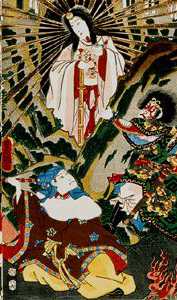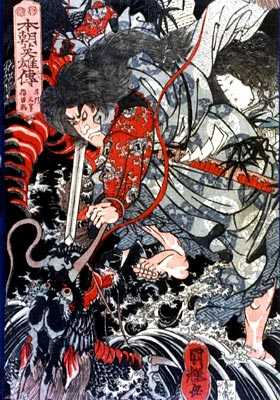Toyotama-hime

Toyotama-hime (豊玉姫) (Japanese for "Lady Bountiful Soul"[1]), better known as Otohime (乙姫), is a goddess in Japanese mythology and is featured in the Kojiki as well as Nihon Shoki. She is the beautiful daughter of Ryūjin, the god of the sea.
Toyotama first met the hunter-turned-fisherman Hoori (a descendant of the sun goddess Amaterasu) when he was trying to find his brother's lost fishing hook beneath the waves. It is here he encountered Toyotama who sought her father's permission to assist him on his task. Shortly afterwards, the two both fell in love and soon enough the two got married and spent years together under the ocean. Eventually Hoori began to yearn for the surface world Toyotama who was pregnant with their child, agreed to settle in her husband's native environment for the time being. Late in Toyotama's pregnancy, Hoori built a hut for their family to live in by the sea and it was here that Toyotama requested her husband not watch while she gave birth to their child. Hoori waited patiently while his wife was in labour until Toyotama gave birth to a son named Ugayafukiaezu. Unfortunately, Hoori's curiosity got the better of him and he attempted to spy on his wife. To his surprise however, rather than seeing his wife as he knew her, he witnessed an enormous wani cradling his child. This creature was none other than his beloved Toyotama who had shape-shifted to give birth. After catching her husband spying on her, she was utterly ashamed that her husband broke his promise. Unable to forgive Hoori, she abandoned both him and their child by returning to the sea. Following her departure, she sent her younger sister, Tamayori to help raise the child, in her absence. As Ugayafukiaezu grew of age, he married his aunt Tamayori and their child became the first Emperor of Japan, Jimmu.
The extinct crocodile genus Toyotamaphimeia was named after this deity, in direct reference to this myth.
References in popular culture
- Otohime appears as a character in the video game Ōkami, where allusions to the story of Urashima Tarō are made.
- In the Yu-Gi-Oh! Trading Card Game, there is a group of cards called "Spirit Monsters" that are all based on Japanese gods and other mythological creatures. Otohime is one of the deities featured.
- Mutsumi Otohime from the manga series Love Hina by Ken Akamatsu gets her name sake from her (just as Keitaro Urashima's name is taken from Taro Urashima).
- Queen Otohime of Fishman Island from the popular manga and anime series One Piece, is also based on her. Other allusions to the legend of Urashima are connected to the island, including a box named the Tamatebako that is in the royal family's possession.
- In the anime series Lilpri, Otohime appears as the goddess who causes the aging problems.
- In the anime series Gin Tama, Otohime, the ruler of Ryugu Palace, is also based on her.
- In the anime series Muromi-san, Otohime works at the fishing goods shop in human world because her Dragon Palace is closed down.
- In the popular phone app game Fantasica by Mobage, Otohime is an 8* character.
- Throughout Japanese media, human-dragon hybrids (former on their mother's side as the case with Toyotama) are commonplace, notably in video games such as Popolocrois, Fire Emblem and Breath of Fire.
References
- ↑ Ō no Yasumaro (2014). The Kojiki : an account of ancient matters. Gustav Heldt, translator. ISBN 9780231163897.
| |||||||||||||||||||||||||||||||||||||||||||||

